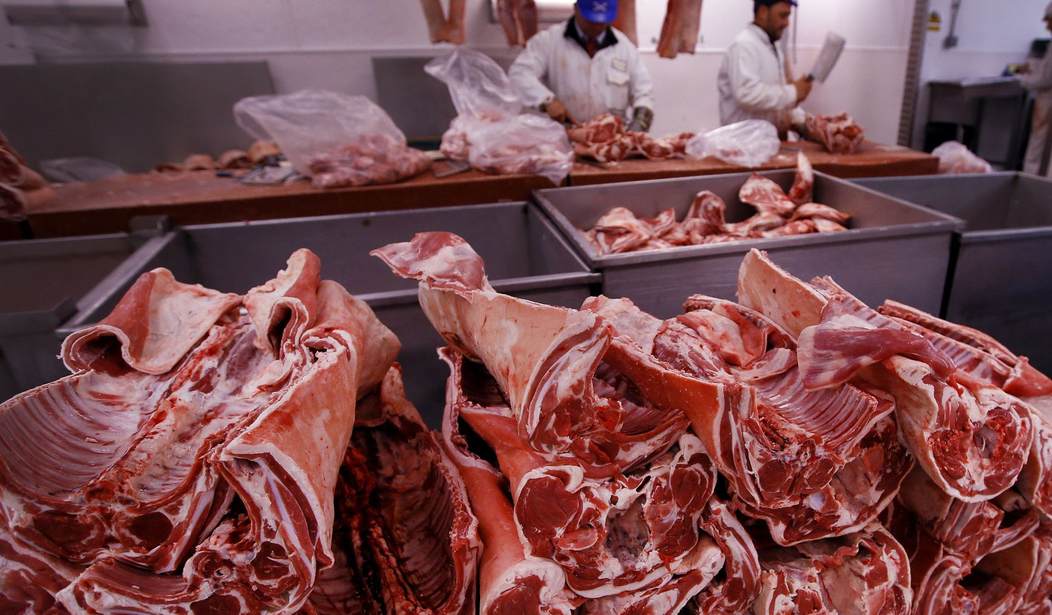Just a few closures of meat packing plants are putting the entire meat industry on the brink of collapse. A congressman who also raises cattle sounded the alarm for years that burdensome regulations needed to go. Now will Congress act in time?
Representative Thomas Massie (R-Kentucky) is gaining bipartisan support for his PRIME Act, which stands for Processing Revival and Intrastate Meat Exemption Act. The bill has been sitting in the House and the Senate for nearly a year, meaning it could be fast tracked to President Donald Trump if the political will is there.
The legislation lifts restrictions on over 1,000 mom-and-pop meat processing plants that aren’t allowed to supply restaurants, schools, hotels, and the like. Yes, you read that right. The American people are dependent on a few big businesses that enjoy great advantages thanks to regulation.
Massie has proposed this common-sense solution for years to no avail. Apparently nobody was listening, just like when he opposed the $2.2 trillion stimulus package in late March. However, since Tyson Foods board chairman warned the supply chain was “breaking,” and Trump ordered meat processing plants to stay open, Massie is no longer being ignored.
This food supply issue is so critical to public health and the economy, that if Massie succeeds in revamping the meat supply chain, he deserves a House leadership post. He knows what he’s talking about when he warns that food shortages are coming. He raises cattle. His multiple patents and master’s degree in mechanical engineering from MIT don’t hurt either.
Recommended
The small meat processing businesses that the PRIME Act would free up to work for the American people are already subjected to unannounced USDA inspections, so there’s no need to lower standards. They’re not allowed to sell to grocery stores simply because they don’t have an inspector on staff at all times, a rule more easily afforded by the big businesses.
“Let those small meat processors fill in the gaps so that we don’t have the dangerous situation where we’re euthanizing animals instead of providing them as food,” Massie told Breitbart’s Joel Pollak.
The bill would also give the states back enough of their sovereignty so intrastate distribution of custom-slaughtered meat could take place. Not only would this allow for flexibility and resilience in the industry, but the vulnerability to contamination would be mitigated better as well.
It’s more than a little ridiculous that in the land of the free, these are some of the reasons why food supply chains are breaking and animals are being uselessly killed by the thousands.
How did it get this way? Americans can’t be blamed for being ignorant of how the meat supply chain works. We still have a market economy with a division of labor, so it shouldn’t take special knowledge of how the food is produced in order to secure some for your family.
If Massie’s bill fails, by the way, it might be a good idea to find a local farmer and be his friend. Already in Oklahoma, there are ranchers and farmers reaching out directly to consumers.
Like most business regulations, the ones revolving meat packing are much more burdensome on small businesses and entrepreneurs than on the big dogs. Not to mention it’s taxpayers who foot the bill for these inspections, not the businesses that derive profits from the sticker labels that boast of their product quality.
Ostensibly, the rules are written to protect the consumer, but in reality, they just protect the large corporations against competition. That hurts the consumer, as the big businesses aren’t incentivized to innovate or improve to the same degree as they would be without the government protection.
This has been going on for far too long.
Michael Maharrey, communications director for the Tenth Amendment Center, notes that since the Wholesome Meat Act of 1967, the number of slaughterhouses has fallen from over 10,000 to just 2,766 last year. That law requires all meat be slaughtered and processed under federal inspection or under a state authority with regulations at least as strict.
The unbroken history of the meat packing industry pushing for mandatory inspections actually goes back some 130 years. Economist Murray Rothbard covered the origins in his essay The Meat-Packing Myth. As a response to European prohibitions on American meat imports, the US meat industry lobbied for the first mandatory inspection law in 1891.
In the decade before that first inspection law, meat packing locations grew from 872 in 1879 to 1,367 in 1889. Less than ten years after the 1891 law, the top three meat packing firms represented 78 percent of the whole industry.
The worst thing that can happen to Massie’s effort is for special interests to taint its strength, the principle of decentralization. Undoubtedly, there will be more bailouts pursued as well.
Crony capitalism is the worst contamination threat to the beef, poultry, and pork markets. Americans have enough to worry about in this economic downturn. They shouldn’t be seeing unstocked shelves or high prices just because big business interests cheated the free market with the help of bureaucrats and central planners.

























Join the conversation as a VIP Member